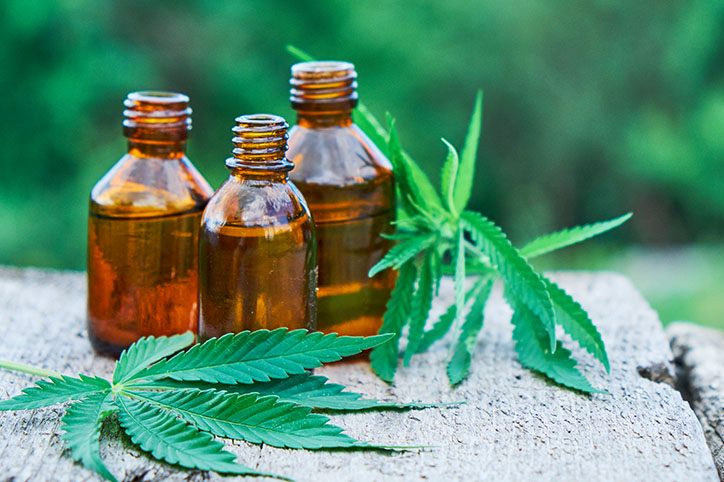I’ve suffered from anxiety and insomnia on and off for years, as well as aches and pains caused by lupus and other autoimmune disorders. In January of this year, my husband and I embarked on a journey into a more natural and earth-loving lifestyle, favoring a vegan diet and ridding our home of as much heavily processed or chemical-filled products as possible.
After a lapse in mental health care following an out-of-state move last year, I was simultaneously feeling stressed, exhausted, and highly anxious. Before biting the bullet and finding a psychiatrist and therapy team here in our new city, I decided to give CBD oil a try.
I’d heard other moms talking about the new trend in “natural” medication alternatives. CBD (or Cannabidoil) is extracted from from the cannabis plant, but unlike THC that provides a high, it does not have psychoactivity. However, many claim that ingesting the oil helps with anxiety, sleep and mood disorders, cognition, pain, and symptoms of autism.
Historically, trends like this have never really spoken to me. I’ve always opted for medical attention over crystal healing. While I’m a devoted yogi, I always see a doctor before dousing myself or my home in essential oils. I was quick to shrug off the CBD trend I started seeing mentioned frequently in parent groups on Facebook and talked about in circles of friends. But it wasn’t until my own mom, a therapist by trade, suggested I try it, that I actually considered the potential merit in the oil.
There are a ton of ways to take CBD oil — from a few drops directly under your tongue to a slew of baked goods, candies, and other treats made with it. I opted for the former because it was easy, straightforward, and without excess calories.
At the time that I started taking CBD oil, I was experiencing chronic insomnia and fatigue coupled with staggering anxiety most days of the week. I had been off of any SSRI or mood stabilizer for about six months, and was feeling the strain of going without my medication. I started with a couple of drops at bedtime and was pretty impressed by the results: a typical three-hour ordeal of tossing, turning, scrolling my social media feeds, turning the television on and off several times over, and finally falling asleep, was shortened to about a twenty-minute process. That was good enough for me!
Over the next few weeks, I used the oil at bedtime to similar results and was pretty happy with the outcome. I also found that in the afternoons, when my kids were driving me absolutely crazy and I felt like I was going to explode, a drop or two under the tongue seemed to help.
I was pretty impressed with the wonder oil, not least of all because it was widely available and openly discussed, even in my small Bible Belt town where people don’t seem to talk much about mental health.
However, there were a couple problems: first, I had no idea how much I was supposed to be taking. My little bottle was lasting, but the dosing information on the back simply said to “take desired amount.” When I called my primary care doctor for advice on a “desired amount,” I was informed that I’d need to come in to talk about it, which got me thinking.
I went on taking a few drops at a time with good results, but wasn’t sure how many times a day was too many. Also, I’m on a longterm medication for my lupus and had read that taking CBD oil could interfere with it. (Just like any medication or vitamin, interference or a detrimental effect on the half-life of another medication is possible. You should always talk to a physician before adding a supplement of any kind, including CBD oil, to your regimen).
And while the CBD was helping my sleep, and taking the edge off my most severe panic attacks, I decided after about a month of use that the most responsible course of action was to speak to a doctor about it after all. Rather than going in to see my primary, I finally made an appointment at a behavioral health facility to speak with a psychiatrist about my anxiety and sleep problems.
My shrink listened to my symptoms and history, and prescribed an SSRI to help with my anxiety, plus an over-the-counter melatonin supplement for the insomnia. She also suggested talk therapy to help me reframe and calm down when the stress hit hard. While she wasn’t opposed to CBD oil in general, she didn’t think it was enough for my specific issues.
I still have my bottle, and have doled out a few drops to my husband with great results when he couldn’t sleep. I will reach for it, with the approval of my medical team, in a moment of anxiety before going for a heavy duty pharmaceutical, too. And to me, CBD oil seems like a great option for those who do not suffer terrible anxiety or depression but rather need something occasional to take the edge off.
But because my personal mental health needs are more ongoing and predictable, the help of a psychiatrist, therapist, and prescription medication is a better fit for me, for now. I won’t be pouring my CBD down the drain any time soon, though. I’ve seen firsthand how helpful it can be in a pinch!
